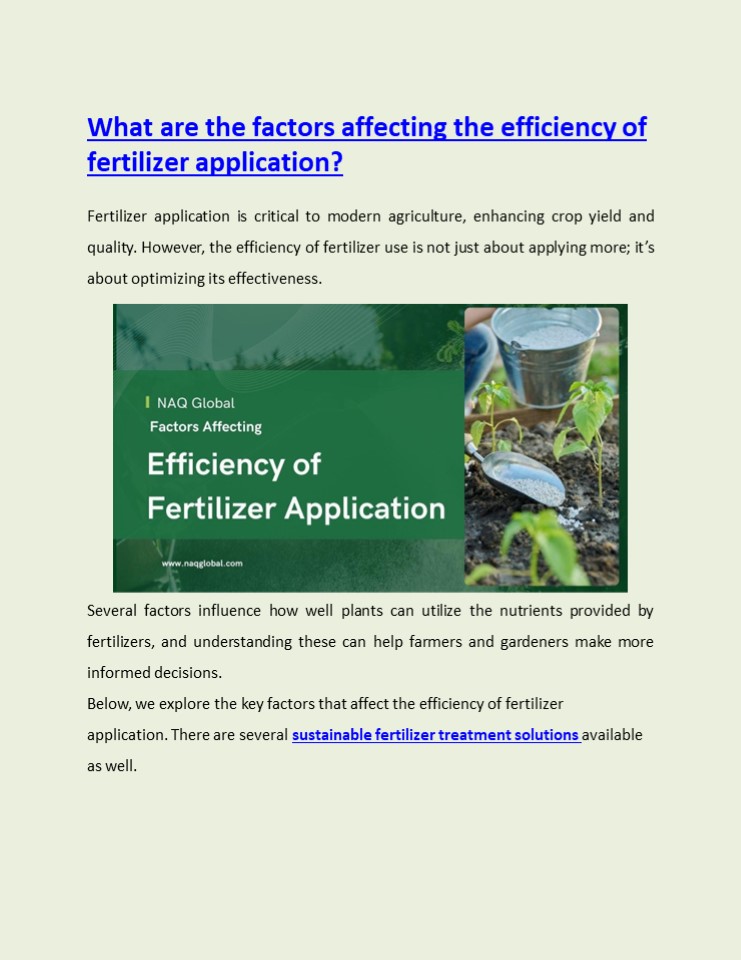Some Factors Affecting the Efficiency of Fertilizer Application - PowerPoint PPT Presentation
Title:
Some Factors Affecting the Efficiency of Fertilizer Application
Description:
Several factors influence how well plants can utilize the nutrients provided by fertilizers, and understanding these can help farmers and gardeners make more informed decisions. Below, we explore the key factors that affect the efficiency of fertilizer application. There are several sustainable fertilizer treatment solutions available as well. – PowerPoint PPT presentation
Number of Views:4
Title: Some Factors Affecting the Efficiency of Fertilizer Application
1
What are the factors affecting the efficiency of
fertilizer application?
Fertilizer application is critical to modern
agriculture, enhancing crop yield and quality.
However, the efficiency of fertilizer use is not
just about applying more its about optimizing
its effectiveness.
Several factors influence how well plants can
utilize the nutrients provided by fertilizers,
and understanding these can help farmers and
gardeners make more informed decisions. Below,
we explore the key factors that affect the
efficiency of fertilizer application. There are
several sustainable fertilizer treatment
solutions available as well.
2
- Type of Fertilizer
- The choice of fertilizerwhether chemical,
organic, or a combination of both significantly
affects its efficiency. Chemical fertilizers are
immediately available to plants but can quickly
leach away. In contrast, organic fertilizers
release nutrients more slowly and improve soil
structure but may not immediately meet rapid
nutrient demands. Each type has its specific
application scenarios based on crop needs and
soil conditions. Organic fertilizer coating is
very useful in improving the quality of
production. - Soil Health and Composition
- Soil health is foundational to fertilizer
efficiency. Nutrient-rich, well-structured soils
with good tilth and organic matter promote better
root growth and nutrient uptake. Parameters like
soil pH, electrical conductivity, and organic
matter content influence nutrient availability
and should be adjusted to match the nutrient form
in the applied fertilizers. For instance,
certain nutrients are more available in acidic or
alkaline conditions. Green technology for
fertilizer is highly beneficial when it comes to
solutions. - Application Method
- Fertilizers can be applied in various ways,
including broadcasting, side dressing, foliar
application, and fertigation. Each method affects
how closely the nutrients are placed on the
plant roots and their availability. For instance,
fertigation can enhance nutrient uptake by
delivering fertilizers directly through
irrigation systems, minimising losses and
improving distribution uniformity.
3
- Timing of Application
- The timing of fertilizer application can
significantly influence its efficiency. Applying
fertilizers when plants are most actively growing
and can uptake nutrients can lead to better
utilization and less wastage. For example, using
nitrogen during the early stages of leafy
vegetable growth can optimize growth rather than
later in the season when it could promote
excessive leafiness over fruit production. - Environmental Conditions
- Weather conditions at the time of application and
subsequently can affect fertilizer efficiency.
Rainfall can wash away fertilizers, while drought
conditions can prevent roots from dissolving and
absorbing nutrients. Temperature also plays a
role, as colder soils can slow down microbial
activity and nutrient availability. - Water Management
- Proper irrigation is crucial in enhancing
fertilizer uptake. Both over- and under-
irrigation can lead to nutrient leaching or
ineffective nutrient use. Maintaining an optimal
moisture level in the soil ensures that nutrients
are adequately dissolved and are available to
plant roots. - Crop Type and Growth Stage
- Different crops have varying nutrient needs at
various growth stages. Tailoring fertilizer
types and application rates to the specific crop
and its growth stage can significantly improve
efficiency. For instance, grain crops may require
higher nitrogen levels at planting and early
growth stages but less during grain-filling.
4
- Precision Agriculture Techniques
- Modern technologies like GPS, sensors, and drones
are revolutionizing fertilizer applications in
agriculture. Precision agriculture techniques
allow for the variable- rate application of
fertilisers, which adjusts the amount of
nutrients applied in specific areas of a field
based on real-time data about soil and crop
conditions. This can lead to significant
improvements in efficiency and environmental
sustainability. - Regulatory and Economic Factors
- Regulations related to nutrient runoff and
environmental protection can affect how and when
fertilizers are applied. Economic factors, such
as the cost of fertilizers and the financial
returns on crop yields, also play a critical role
in decision-making processes regarding
fertilizer use. - Conclusion
- Maximizing the efficiency of fertilizer
application requires a holistic approach that - considers various agronomic and environmental
factors. By understanding and managing these
factors, farmers can ensure that they use
fertilizers most effectively and sustainably,
leading to better crop yields and reduced
environmental impact. As the agricultural sector
evolves, staying informed and adapting to new
methods and technologies will be crucial in
achieving these goals. - Source Link
- https//www.reddit.com/user/NaqGlobal1/comments/1c
bsw04/some_factors_affecting_the - _efficiency_of/































